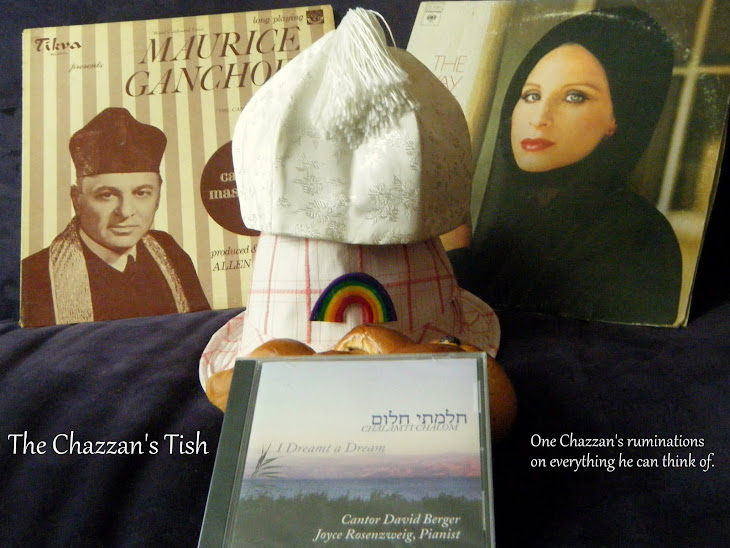This week I want to turn our focus to a short petition that is inserted into the last blessing of the Amidah (the central prayer) from Rosh Hashanah all the way through the end of Yom Kippur.
The last blessing of every Amidah is a prayer for peace. In the morning service it is "Sim Shalom" and in the evening and afternoon services it is "Shalom Rav." There are many melodies probably already going through your heads for those blessings we encounter each time we come together to pray.
During the High Holy Days, we add a bit to the end of those prayers for peace - as if to remind God (and ourselves), just before we end our Amidah, that our prayers today are directed with a different, and special kavanah (intention).
We say:
In the book of life, blessing, peace and prosperity,Download Cantor David Berger - B'seifer Chayim
may we and all Your people, the house of Israel,
be remembered and inscribed before You for a life of goodness and peace.
Blessed are You Adonai, Maker of peace.
What is this book - and, indeed, how many books are there? If you look through the High Holy Day Machzor (prayerbook) you'll see a lot of books listed. Are we to imagine a heavenly library with all different kinds of phone books (and I don't mean the yellow pages vs the white pages)?
Can we actually believe that our fates are pre-ordained and written down from year to year? Too many times our experience of the world has shown us otherwise - life is by its very essence unpredictable, unexpected and ever changing. If I tried to sit down today and write down what I think (now) was my compiled entry in all of those heavenly phone books from last year...
What bookkeeper could possibly have inscribed the citizens of Haiti for the year they have had? What entries are being prepared for those displaced by the floods in Pakistan? These questions are enough to shake my faith to its core.
Still - I like the books. It helps me feel like I know what to pray for. Praying for a good year for myself - for peace, serenity, prosperity and the like feels somehow selfish and silly. The book helps me to focus my thoughts - as preposterous an image as it might be.
So we sing together - this prayer, as you may have noticed, is in the first person plural - the default voice for Jewish prayer. We ask that if there are indeed books up there - that we find ourselves written in the right ones and that we continue to receive the blessings of life, blessing, peace and prosperity that have been with us till now.
Interestingly, this blessing usually ends with "Blessed are You Adonai, who blesses Your people Israel with peace." During these Days of Awe, our tradition reminds us that our vision must be wider and our hopes grander. We cannot pray for peace only for ourselves and our people - we must praise God, the Maker of peace for us, for our people, and for the entire world.
The melody we usually sing for this text was written by Israel Goldfarb (1879-1967). Goldfarb was a Rabbi, Cantor, and professor at both the Jewish Theological Seminary and the Hebrew Union College. His melodies fill our homes and synagogues every week - "Shalom Aleichem," "Magein Avot," "V'ne'mar" and others have achieved the status of "Misinai Melodies" - tunes that seem to have been given by God to Moses at Mount Sinai.
Listen to the melody here:
Download Cantor David Berger - B'seifer Chayim
B'seifer chayim b'rachah v'shalom ufarnasah tovah,
Nizacheir v'nikateiv l'fanecha,
Anachnu v'chol am'cha beit Yisra'eil,
L'chayim, l'chayim tovim ul'shalom.
The music is in a minor key and has a sense of melancholy - but it turns optimistic at the phrase "anachnu v'chol am'cha beit Yisra'eil" "May we and all Your people, the house of Israel" as if to remind us that we are stronger and happier when we are in community.
Perhaps Goldfarb, a great community builder, wanted to teach us that if we can come together here - in prayer, song and action - we can partner with God and do the work to open the books of life, blessing, peace and prosperity for this coming year for ourselves and, indeed for the world.


Thanks for posting these! It's nice to hear you sing and read your thoughts in preparation for the high holidays. L'shanah tovah!
ReplyDeleteI think this is an informative post and it is very useful and knowledgeable. therefore, I would like to thank you for the efforts you have made in writing this article. Fakaza Music
ReplyDelete